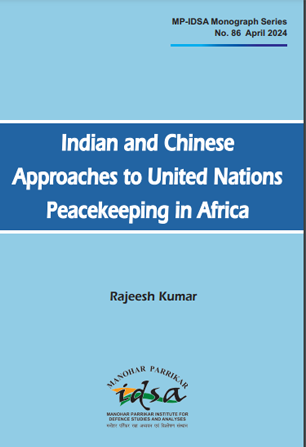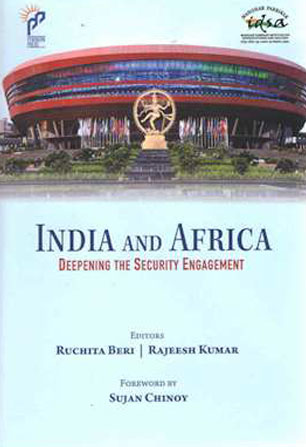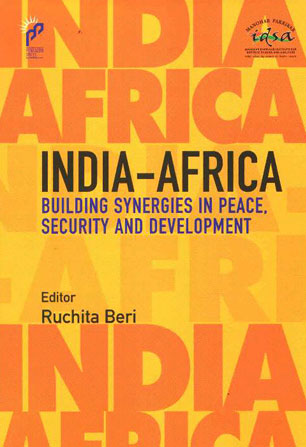IBSA: Avoiding Being BRICked Up
In his opening address at the 2011 India-Brazil-South Africa (IBSA) summit held in Pretoria/Tshwane, President Jacob Zuma of South Africa said the essence of the grouping was ‘Back to Basics: When Democracy and Development Work Together for a Better Life’.
India amidst Increased Activity in the Security Council: A Few Observations
Article 1 of the United Nations Charter declares the maintenance of international peace and security to be the primary function of the United Nations. This makes the United Nations Security Council (UNSC) the most important organ of the whole establishment. All other functions and engagements of the United Nations are in support of the primary cause.
Engaging Iran in the New Strategic Environment: Opportunities and Challenges for India
In recent years, Iran has come to acquire a significant place in the West Asian region with the ability to influence regional politics. For India, relations with Iran are vital. In the changed strategic environment, both India and Iran have been working towards improving their bilateral relations. However, there are several challenges, especially for India, in this regard. If the Iran-US confrontation intensifies, for example, India may find it difficult to pursue a smooth relationship with Iran.
Turkey–Brazil Involvement in Iranian Nuclear Issue: What Is the Big Deal?
The Iranian nuclear stand-off is still a major issue in global politics. From international players like the European Union, the United States and the United Nations, to individual states, almost each country has its own stake in the issue. However, the recent deal brokered by Turkey and Brazil has not only changed the nature of the issue, but also the discussion itself. The deal has changed the nature because the one-sided dialogue between the international community and Iran is no longer relevant.
Changing Face of Turkey
Turkey is blessed with a favourable geography. It straddles Asia and Europe, is surrounded by sea on three sides, controls the only link to the Black Sea, and has moderate climatic conditions, abundant energy resources in its neighbourhood and a defensible terrain. It also has the civilisational and historical past, having ruled over large swathes of territory including North Africa, the Middle East, the Balkans, Caucasus and Central Europe in the heyday of the Ottoman Empire.
The Domestic Determinants of Iranian Foreign Policy: Challenges to Consensus
The foreign policy of the Islamic Republic of Iran is widely misunderstood. On the one hand many experts regard the Iranian foreign policy as being essentially ideology driven while on the other hand a significant body of opinion believes that ideology is a convenient smokescreen for Iran's pursuit of its national interests. This paper examines the role of ideological, political and institutional actors in the context of the Islamic Republic's quest for consensus and cohesion.
Protest Movements in West Asia: Some Impressions
The pro-democracy uprisings in West Asia began with Tunisia, where the dictator Zine El Abidine Ben Ali fled the country in a dramatic fashion and found refuge in Jeddah, his new home in exile in Saudi Arabia. The Tunisian revolt had a dramatic impact on Egypt, where a non-violent uprising, brewing for some years, sought the removal of the regime of Hosni Mubarak, president for 28 years. While the movement for change in Egypt was still underway, a pro-democracy revolt erupted in Bahrain, which became the first country in the Gulf whose people sought a fundamental political transformation.
Piracy in Somalia: Addressing the Root Causes
Rampant piracy off the Somalia coast has brought the strife-ridden country back into attention. Economic hardship, and a deep resentment and anger against foreign exploitation of Somalia's maritime resources, have inspired the pirates to declare themselves 'coast guards of Somalia'. However, the growing attacks by the pirates have had an adverse impact on global commercial shipping. The international community has responded to this predicament by massive naval deployments in the Gulf of Aden.
Iran’s Revolutionary Guards: Ideological But Not Praetorian
The role of Iran's Islamic Revolutionary Guards Corps (IRGC) has come under an increasing spotlight in recent years. This scrutiny has intensified in the wake of the controversial June 2009 presidential elections and the unrest which followed. Western governments, in tandem with the more radical sections of the Iranian opposition, appear keen to construct a narrative wherein the IRGC steadily displaces the ruling clergy as Iran's political masters. Fears of a growing political role for the IRGC – let alone a full-blown military takeover – are overstated.










